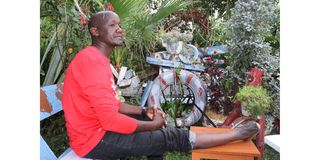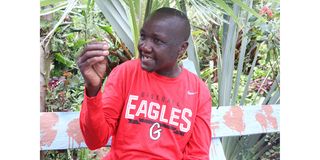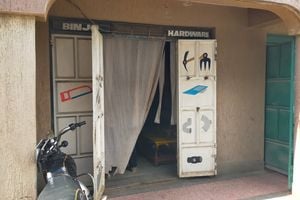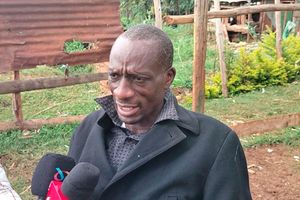
Augustine Kipter, 39, at his compound in Ratabei village, on the outskirts of Kabarnet town during an interview on November 13, 2024.
Thirty-nine-year-old Augustine Kipter is an environmental conservationist whose landscaping skills are most sought after in Baringo County.
What many don’t know, however, is that he was once an alcoholic for more than 18 years to the extent he lost many jobs and his leg was amputated after a fall into a kitchen fire while drunk.
As fate would have it, the 2017 encounter would mark the turning point in his life from an alcoholic to a most admired landscaper.

Augustine Kipter, 39, from Ratabei village on the outskirts of Kabarnet town displays his foot on November 13, 2024, that was amputated after he sustained burns at his home seven years ago when he was drunk.
The genesis
In 2000, Kipter who hails from Ratabei village on the outskirts of Kabarnet town in Baringo Central was excited to be admitted to Form One at a local secondary school.
Like his peers, he looked forward to life away from his parents, washing his clothes and taking care of his belongings.
However, months after his admission, his peers introduced him to the local busaa brew, which some smuggled into school at night.
That marked the beginning of his indulgence in alcohol, an urge that worsened gradually, and eventually, he turned into a serious alcoholic who could not fall asleep without a sip of the ‘bottle’.
It is a miracle that he completed secondary school, he tells Nation.Africa.
Deep in alcoholism
After school, the local joints became his first visit every morning. He would lazily find his way home late in the night in a drunken stupor, and many are the nights he spent in the trenches, he recalled in an interview.
In 2008, he was employed by a mobile phone service provider company, Safaricom, and deployed to Kapenguria in neighboring West Pokot County. There, he worked for barely two years before he was fired due to alcoholism.
He recalls earning good money, but his situation only worsened because all he did was spend it on alcohol and cigarettes.
“My employer could not tolerate my inappropriate behavior and I was fired,” recalls Kipter, now a father of two.
It is at this time that his wife left him and he had to retreat to the village, having squandered all his savings on alcohol.
Back in the village, he turned to menial jobs to raise money, not for his basic needs but to buy alcohol.
In February 2012, he secured another job at a flower farm in Kitengela. However, he only worked there for one and a half years before he was again sacked for being unproductive.
He would report to work very late or while drunk. Sometimes he would fall asleep at the greenhouse instead of working.
“I was fired after several warnings from the manager and again had to retreat to my village,” he recalled.
Toll on family
Back home, he became a burden to his family who could bail him out every time he was arrested for causing disturbances or starting fights, among other inconveniences that landed him in trouble often.
Still not giving up on him, his family took him to driving school, hoping he would change his ways.
“I was arrested so many times that I lost count, to the extent I became a common figure in their cells,” he narrates, recalling how his siblings bailed him out until they got tired.
“Even the police told them to stop wasting their money and let me carry my cross because I had become their frequent visitor and would be re-arrested after one or two days,” he recalls.

Augustine Kipter, 39, at his compound in Ratabei village, on the outskirts of Kabarnet town during an interview on November 13, 2024.
At the driving school, he trained as a plant operator and upon completion, was once again lucky, this time securing employment at Baringo County government as a Grader driver.
But as fate would have it, his alcoholism, yet again, cost him this job.
As usual, he retreated to his parent's home, and this time, his situation had worsened.
He jokes that motorists had ever been warned of a drunk man who was usually spotted staggering along the Kabarnet – Kapropita road, and sometimes sitting in the middle of the road.
One time he was arrested and charged in court for selling illegal brews and put on probation. During this time, while cleaning the court as part of his probation, he came across illegal brews that had been presented as exhibits and drank them.
“That is how bad my urge for alcohol was. I could not resist the temptation, no matter how risky the situation was,” narrated Mr Kipter.
The turning point
It wasn’t until December 2017 that he had an encounter that marked a turning point in his life.
He recalls consuming an illegal liquor that was new in the market and staggered home. He had fallen asleep before he was woken up by hunger pangs at around 3pm and he decided to make a meal in his one-roomed timber structure.
He had settled for bananas and potatoes for his late lunch and while waiting for the meal to get ready, remembered that he had a bottle of the ‘new liquor in town’ and took a few more sips.
To complete his urge, he smoked some cigarettes and recalls experiencing some tremors in his right leg, before falling into the fire.
His leg burned, but he did not feel it. It was only later when one of his siblings came to check on him that he found his leg on fire, with the shoe still on.
He was rushed to the Baringo County Referral Hospital and admitted.
The burnt leg was in a bad state and medics recommended that part of it be amputated to prevent further damage.
He spent more than three months at the facility after undergoing six surgeries.
“My condition worsened and I was taken to St Luke’s Hospital in Eldoret where I fully recovered, but after losing part of my leg. My siblings ended up spending more than Sh500,000 to clear the medical bills,” he said, fighting tears.
Six months after being discharged, a pastor from his local church reached out and urged him to change his ways because he had gone back to drinking.
“I spent some time thinking about my life as an alcoholic and decided to mend my ways, heeding the pastor’s advice to give my life to Christ. That is how I left drinking and smoking for good and became a member of the church and was assigned to take charge of the musical instruments, which I passionately did,” he said.
A second chance at life
After reforming, he secured a job with the Kazi Mtaani programme in 2020, as the country was coming out of the Covid-19 pandemic. This time he used the funds to build himself a three-roomed house and started life on a fresh slate, even remarrying.
Since he could not go back to driving after his leg was amputated, he decided to utilise the skills he learned while working on a flower farm in his previous job and steadily grew into an environmental conservationist planting and selling flower and tree seedlings, besides practicing landscaping.
While at it, he learned to recycle waste materials such as tires, plastics, and any other items using them to plant his flowers and trees.
He had collected usable waste materials while cleaning up Kabarnet town in the Kazi Mtaani programme and used them to plant flowers and trees and decorate his compound.
Pays out
Slowly, his little venture turned into something big as the flowers and trees attracted passersby and ended up earning him several clients who sought his landscaping services.
Nation.Africa toured his home and indeed the compound was a beauty to behold.

Some of the waste materials used by Augustine Kipter from Ratabei village on the outskirts of Kabarnet town to plant flowers and do landscaping in his compound.
Kipter has used every available usable material to grow flowers and do landscaping on the sloppy compound turning it into a beautiful scenery.
So beautiful is his compound that people seek the grounds to hold events such as weddings and related ceremonies, while content creators come for photo shoots.

Augustine Kipter, 39, at his compound in Ratabei village, on the outskirts of Kabarnet town on November 13, 2024, where he has planted flowers and landscaping using waste materials. The man reformed in 2018 from being an alcoholic for more than 18 years to a conservationist.
He has received so many landscaping referrals and says he mainly uses waste material with the intent of conserving the environment.
“This area is also sloppy and many people call me to go and make their compounds habitable through landscaping,” he noted.
Through his new venture, he has assisted more than five of his former alcoholism peers in reform.
Kipter says his encounter with disability gave him a new perspective on life. He thus decided to work as a volunteer at the Kabarnet Deaf and Blind School, assisting children living with disabilities.
“I wake up early to attend to my flowers and trees before I go to work every day. In the evening I return to work on them. That is my daily routine,” he says.
Despite the great strides, Kipter feels sad for his wasted years of alcoholism.
“I lost my leg and a tooth. My first wife left and I lost several jobs. My message to the youth is that alcoholism and drug abuse are bad. Just avoid them like a plague,” he said, tending to his flowers.









